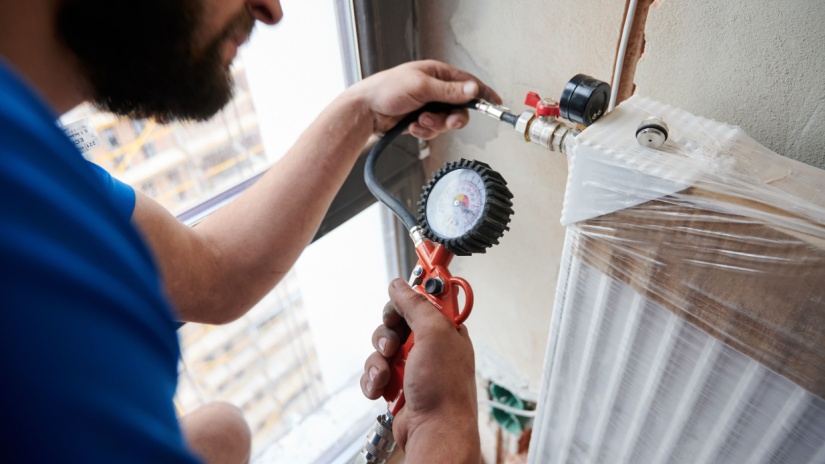Knowledge Centre
Detecting a gas leak

Gas is a staple in many Australian homes, whether it’s used for cooking, heating, or providing hot water. However, with the convenience of gas comes the risk of leaks, which can lead to serious hazards.
Undetected gas leaks can cause dangerous levels of carbon monoxide to build up, posing risks of illness, fires, or even explosions.
While taking steps to prevent gas leaks is crucial, knowing how to detect a leak early is just as important. Prioritising safety by learning how to detect a gas leak could be the difference for keeping your family and home safe.
In this article, we'll walk you through the signs of a gas leak and what you can do to protect your home and family.
What is a gas leak?
A gas leak happens when natural gas, LPG, or other gases escape unintentionally from a pipeline, tank, or other container into an area where they shouldn't be.
Leaks can happen due to damage, wear and tear, corrosion, weak seals at joints, or improper installation or maintenance of appliances.
Recognising the signs of a gas leak is crucial, as an undetected leak could lead to illness, fire, or even an explosion.
Signs and symptoms of a gas leak
If you think there might be a gas leak in your home, your first step should be to turn off the pilot light or gas meter and immediately contact your gas provider or the authorities.
Since natural gas is naturally odourless, suppliers add a strong scent similar to rotten eggs to help you detect leaks and evacuate before it becomes too dangerous. Besides the strong smell of sulphur, there are other signs that could indicate a gas leak:
- A hissing or whistling noise
- Bubbles, dust, or a “cloud” in standing water
- Visible damage to a gas line or connection
- Houseplants that suddenly die
One of the early indicators of a gas leak or high gas levels in your home is symptoms related to carbon monoxide poisoning. These include:
- Feeling very fatigued/exhausted
- Trouble breathing or chest discomfort
- Feeling faint or dizzy
- Persistent headaches
- Irritation in the eyes or throat
- Nausea or loss of appetite
- Depression, irritability, or noticeable mood swings
- Ringing in the ears
- Recurring nosebleeds
As gas levels rise, the amount of oxygen in the air decreases and causes these symptoms to emerge.
Those most vulnerable to carbon monoxide poisoning, such as pets, children, older adults, and individuals with asthma, anaemia, or heart disease, might experience symptoms first. In severe cases, extremely high gas levels can lead to unconsciousness and, without quick medical help, even death.
Checking for a gas leak
In most cases, your sense of smell will alert you first. Before carbon monoxide levels become dangerous, you'll usually notice the distinct odour added to natural gas.
If you suspect a gas leak, it's always best to play it safe. Turn off the pilot light on any gas appliances like your stove, furnace, or water heater, open the windows, and get everyone out of the house. Once you’ve done that, contact your gas supplier immediately - if you're unsure who that is, check your latest bill or visit the Australian Energy Regulator website. Get the whole family outside and stay there until a professional confirms it's safe to return.
Here are a few simple ways to check for a gas leak:
Check your bill
Have you noticed an unusual spike in your gas bills lately? The cost of living is biting many right now and at Compare Energy, we get a lot of calls about finding cheaper energy plans. If you notice a spike in what you’re paying, it may be that gas is leaking somewhere and you’re paying for a leak.
Pay attention to this because wasting gas is going to cost you massively in the long run.
Listen for any hissing or whistling sounds
Stand still and focus on what you can hear. If you know where the gas line is, listen closely for any hissing or whistling noise. Keep in mind that you may not always hear a sound, so don’t rely solely on this method.
Check your gas stove or range
When you turn on the burner, the flame should be blue, which means there’s enough oxygen for the gas to burn properly. If the flame is orange or red, even after it's lit, it could indicate a problem.
Try the soapy water test
This old trick still works! Mix a teaspoon of dish soap with a cup of water and apply it to areas where you suspect a leak, like connections or joints. If bubbles form, gas might be escaping.
Use a natural gas leak detector
The most reliable way to detect a gas leak is with a natural gas leak detector. There are many options available, and you can find recommendations for the best ones online.
Preventing gas leaks
Using gas-powered appliances in your home doesn't have to be a cause for concern if you follow some simple safety measures.
By taking a few proactive steps, you can help prevent potential gas leaks and ensure your appliances operate safely. Here are some key actions you can take:
Install gas detectors
It's wise to install gas detectors in your home. These devices can alert you to any gas leaks early, allowing you to address the issue before it causes significant harm to you, your pets, or your property.
Regular maintenance of these detectors is crucial—remember to change batteries as needed and test them periodically to ensure they are functioning properly.
Be sure to service your appliances
Regular servicing of gas appliances is essential for safety. For instance, gas heaters should be serviced at least every two years.
This not only helps ensure they operate safely but also makes sure they run efficiently, so you get the best performance from your appliances.
Ventilate
Good ventilation is particularly important with unflued appliances. Proper airflow helps prevent the buildup of harmful gases and ensures that any emissions from the appliance are safely dispersed. Make sure your home is well-ventilated to avoid issues with gas leaks and to maintain good air quality.
Always call a certified technician when installing gas appliances
Having a professional install any new gas appliances is crucial. Incorrect installation can lead to gas leaks and potential damage. Certified technicians ensure that your appliances are set up correctly and connected safely, reducing the risk of leaks and other issues.
Huge gas bills not caused by a leak?
If you have noticed that your gas bills have gone up dramatically, the best thing that you can do is call the experts at Compare Energy. We’ve got a team of people ready to help you to select a more cost-effective gas plan and walk you through what you need to know about gas safety.
You can reach us on 1300 790 106 today.

